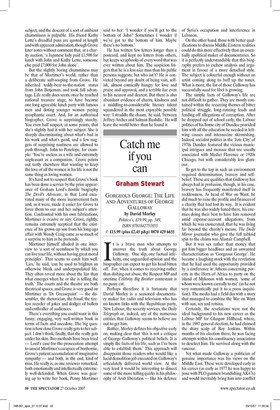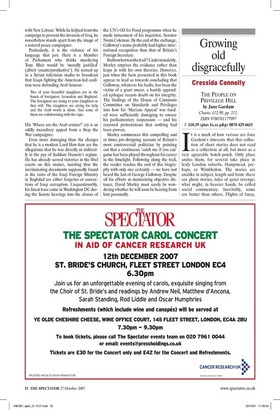Catch me if you can Graham Stewart GORGEOUS GEORGE
Catch me if you can Graham Stewart GORGEOUS GEORGE: THE LIFE AND ADVENTURES OF GEORGE GALLOWAY by David Morley Politico's, £19.99, pp. 349, ISBN 9781842751855 £15.99 (plus £2.45 p&p) 0870 429 6655 1 t is a brave man who attempts to uncover the truth about George Galloway. One slip, one factual infelicity, one unguarded opinion and the biographer can expect to get his head bitten off. For, when it comes to receiving rather than dishing out abuse, the Respect MP and onetime Celebrity Big Brother contestant is no pussy cat.
Perhaps therefore it is fortunate that David Morley is a seasoned documentary maker for radio and television who has no known links with the Republican party, New Labour, the security services, the Daily Telegraph or, indeed, any of the numerous entities that Galloway seems to believe are out to get him Rather, Morley defines his objective early on, making clear that 'this is not a critique of George Galloway's political beliefs. It is simply the facts of his life, such as I've been able to establish them.' This approach will disappoint those readers who would like a lucid demolition job executed on Galloway's articulately delivered world view. At the very least it would be interesting to dissect some of the more telling quirks in his philosophy of Arab liberation — like his defence of Syria's occupation and interference in Lebanon.
On the other hand, those with better qualifications to discuss Middle Eastern realities could do this more effectively than an essentially apolitical maker of documentaries. So it is perfectly understandable that this biography prefers to eschew analysis and argument in favour of a more detached style. The subject is colourful enough without an artist coming along to buff up the tones. What is more, the list of those Galloway has successfully sued for libel is growing.
The simple facts of Galloway's life are not difficult to gather. They are mostly contained within the recurring themes of bitter political struggle, long-running feuds and fending off allegations of corruption. After he dropped out of school early, the Labour politics of his home city of Dundee provided him with all the education he needed in leftwing causes and internecine skirmishing. Indeed, socialist politics in the 'Jute City' of 1970s Dundee featured the vicious municipal intrigues and menace that are usually associated with Medici Florence or 1920s Chicago, but with considerably less glamour.
To get to the top in such an environment required determination, bravery and selfbelief. These are qualities that Galloway has always had in profusion, though, in his case, bravery has frequently manifested itself in recklessness. As head of War on Want, he did much to raise the profile and finances of a charity that had lost its way. It is evident that he was also widely hated there, his enemies doing their best to have him removed amid expense-account allegations, from which he was exonerated, that he was living far beyond the charity's means. The Daily Mirror journalist who gave the full tabloid spin to the claims was Alastair Campbell.
But it was sex rather than money that got him bigger headlines and an unwanted characterisation as 'Gorgeous George'. He became a laughing stock with the revelation that he had used the opportunity provided by a conference in Athens concerning poverty in the Horn of Africa to party on the island of Mykonos with women, 'some of whom were known carnally to me' (as he not very romantically put it to a press inquisition). The media had a field day with a story that managed to combine the War on Want with sun, sex and retsina.
Certainly, the revelations were not the ideal background to his new career as the Labour MP for Glasgow Hillhead, where, in the 1987 general election, he had claimed the shiny scalp of Roy Jenkins Within months of his election there, he was facing attempts within his constituency association to deselect him He survived along with the rancour.
Yet what made Galloway a politician of genuine importance was his views on the Middle East. These were developed early in his career (as early as 1977 he was happy to pose with PLO gunmen brandishing AK47s) and would inevitably bring him into conflict with New Labour. While he helped front the campaign to prevent the invasion of Iraq, he nonetheless stands apart from the image of a natural peace campaigner.
Particularly, it is the violence of his language that jars. Here is a Member of Parliament who thinks murdering Tony Blair would be 'morally justified' (albeit `counterproductive'). He turned up in a Syrian television studio to broadcast that Iraqis fighting the American-led coalition were defending Arab honour: Two of your beautiful daughters are in the hands of foreigners: Jerusalem and Baghdad. The foreigners are doing to your daughters as they will. The daughters are crying for help and the Arab world is silent. And some of them are collaborating with the rape.
His 'Where are the Arab armies?' cry is an oddly incendiary appeal from a Stop the War campaigner.
Even more damaging than the charges that he is a modern Lord Haw-haw are the allegations that he was directly or indirectly in the pay of Saddam Hussein's regime. He has already scored victories in the libel courts on this matter, insisting that the incriminating documents supposedly found in the ruins of the Iraqi Foreign Ministry in Baghdad are either forgeries or concoctions of Iraqi corruption. Unquestionably, his finest hour came in Washington DC during the Senate hearings into the abuses of the UN's Oil for Food programme when he made mincemeat of his inquisitor, Senator Norm Coleman. By the end of the exchange, Galloway's name probably had higher international recognition than that of Britain's Foreign Secretary.
But howhotwas the trail? Understandably, Morley umpires the evidence rather than leaps in with his own theories. However, just when the facts presented in this book appear to lead us towards concluding that Galloway, whatever his faults, has been the victim of a giant smear, a hastily appended epilogue recasts doubt on his integrity. The findings of the House of Commons Committee on Standards and Privileges into how his 'Mariam Appeal' was funded were sufficiently damaging to ensure his parliamentary suspension — and his renewed protestations that nothing had been proven.
Morley commences this compelling and at times jaw-dropping account of Britain's most controversial politician by pointing out that a continuous 'catch me if you can' game has been played throughout his career in the limelight. Following along the trail, the reader reaches the end of this biography with only one certainty — we have not heard the last of George Galloway. Despite all his efforts at maintaining objective distance, David Morley must surely be wondering whether he will soon be hearing from him personally.



































































 Previous page
Previous page